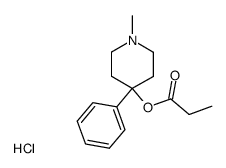1-methyl-4-phenyl-4-propionyloxypiperidine*HCl

1-methyl-4-phenyl-4-propionyloxypiperidine*HCl structure
|
Common Name | 1-methyl-4-phenyl-4-propionyloxypiperidine*HCl | ||
|---|---|---|---|---|
| CAS Number | 4968-48-3 | Molecular Weight | 283.79400 | |
| Density | N/A | Boiling Point | N/A | |
| Molecular Formula | C15H22ClNO2 | Melting Point | N/A | |
| MSDS | N/A | Flash Point | 35.6 °F | |
| Symbol |


GHS02, GHS07 |
Signal Word | Danger | |
|
Glioma cell death induced by irradiation or alkylating agent chemotherapy is independent of the intrinsic ceramide pathway.
PLoS ONE 8(5) , e63527, (2013) Resistance to genotoxic therapy is a characteristic feature of glioma cells. Acid sphingomyelinase (ASM) hydrolyzes sphingomyelin to ceramide and glucosylceramide synthase (GCS) catalyzes ceramide metabolism. Increased ceramide levels have been suggested to e... |
|
|
Gas-liquid chromatographic-mass spectrometric determination of 1-methyl-4-phenyl-4-propionoxypiperidine using a stable isotope-labeled analogue as an internal standard.
J. Chromatogr. A. 408 , 356-9, (1987)
|
|
|
Involvement of gangliosides in glucosamine-induced proliferation decrease of retinal pericytes.
Glycobiology 15(6) , 585-91, (2005) The hexosamine pathway (HP) is a biochemical hypothesis recently proposed explaining cellular alterations occurring during diabetic microvascular complications. Diabetic retinopathy is a common microvascular complication of diabetes, and it is known that cell... |
|
|
Apoptosis-induced inhibition of CD1d-mediated antigen presentation: different roles for caspases and signal transduction pathways.
Immunology 125(1) , 80-90, (2008) The stimulation of programmed cell death can either enhance or inhibit antigen presentation by classic major histocompatibility complex molecules. In the current study, we report that the induction of apoptosis by topoisomerase I inhibition or elevation of in... |
|
|
Chronic Parkinsonism secondary to intravenous injection of meperidine analogues.
Psychiatry Res. 1 , 249-254, (1979) Abuse of 4-propyloxy-4-phenyl-N-methylpiperidine, a meperidine congener, produced parkinsonism in a 23-year-old man. Unlike other drug-induced motor disturbances, the syndrome persisted for 18 months and responded to drugs that stimulate dopamine receptors. B... |
|
|
Modulation of amyloid precursor protein processing by synthetic ceramide analogues.
Biochim. Biophys. Acta 1801(8) , 887-95, (2010) Previous studies suggest that membrane lipids may regulate proteolytic processing of the amyloid precursor protein (APP) to generate amyloid-beta peptide (Abeta). In the present study, we have assessed the capacity for a series of structurally related synthet... |
|
|
Importance of glycolipid synthesis for butyric acid-induced sensitization to shiga toxin and intracellular sorting of toxin in A431 cells.
Mol. Biol. Cell 7(9) , 1391-404, (1996) The human epidermoid carcinoma cell line A431 becomes highly sensitive to Shiga toxin upon treatment with butyric acid. This strong sensitization (> 1000-fold) is accompanied by an increase in the fraction of cell-associated toxin transported to the Golgi app... |
|
|
Neutral sphingomyelinase activity dependent on Mg2+ and anionic phospholipids in the intraerythrocytic malaria parasite Plasmodium falciparum.
Biochem. J. 346 Pt 3 , 671-7, (2000) Sphingolipid metabolism and metabolites are important in various cellular events in eukaryotes. However, little is known about their function in plasmodial parasites. Here we demonstrate that neutral sphingomyelinase (SMase) involved in the sphingomyelin (SM)... |
|
|
Apoptosis of human carcinoma cells in the presence of potential anti-cancer drugs: III. Treatment of Colo-205 and SKBR3 cells with: cis -platin, Tamoxifen, Melphalan, Betulinic acid, L-PDMP, L-PPMP, and GD3 ganglioside.
Glycoconj. J. 20(9) , 563-77, (2004) Breast cancer is the most common type of cancer, predominantly among women over 20, whereas colo-rectal cancer occurs in both men and women over the age of 50. Chemotherapy of both cancers affect rapidly growing normal as well as cancer cells. Cancer cells ar... |
|
|
Apoptosis of human carcinoma cells in the presence of inhibitors of glycosphingolipid biosynthesis: I. Treatment of Colo-205 and SKBR3 cells with isomers of PDMP and PPMP.
Glycoconj. J. 20(3) , 157-68, (2004) Apoptosis, or programmed cell death, plays an important role in many physiological and diseased conditions. Induction of apoptosis in cancer cells by anti-cancer drugs and biosynthetic inhibitors of cells surface glycolipids in the human colon carcinoma cells... |